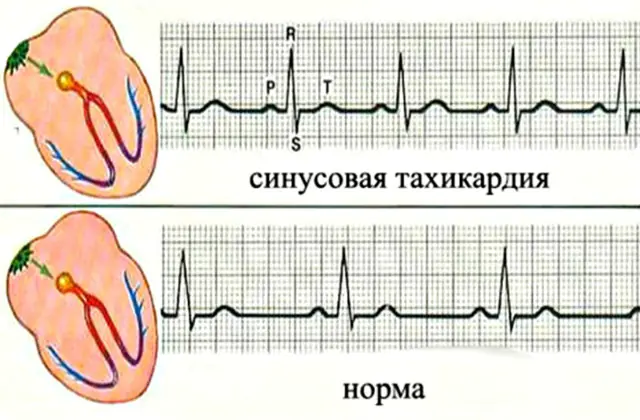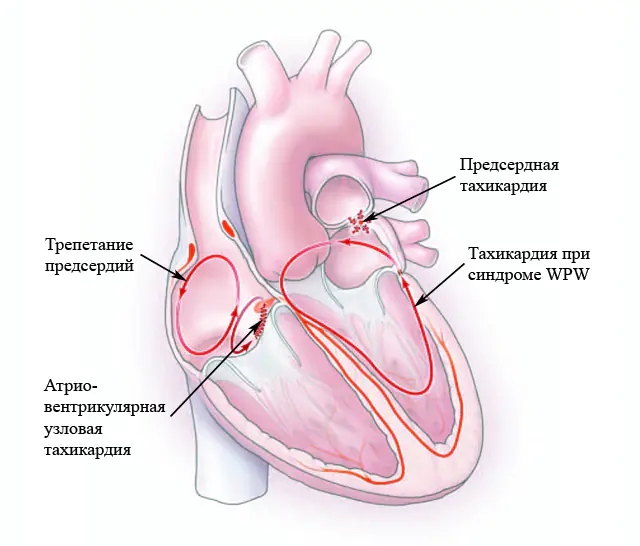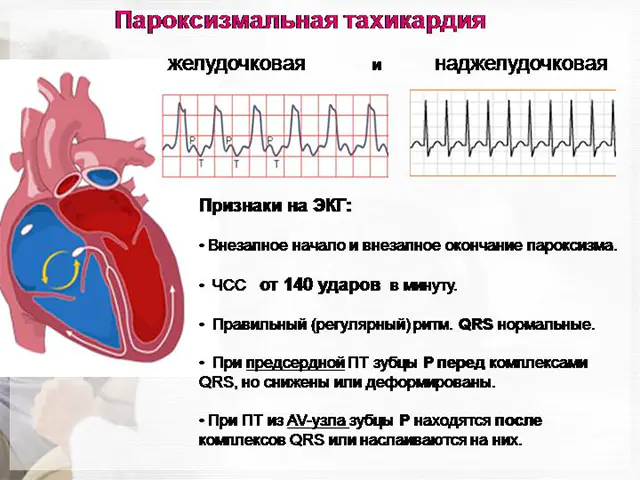
What is tachycardia during pregnancy and why is it dangerous? Causes and clinical picture. Diagnosis and treatment of tachycardia during pregnancy. Prevention of pathology.
The content of the article:- What is tachycardia during pregnancy
- Reasons for development
- Main symptoms
- First aid
- How to treat tachycardia
- Prevention
Tachycardia during pregnancy is both physiologically determined processes and attacks of rapid heartbeat in a woman, indicating possible pathologies of the cardiovascular system. An increase in rhythm in itself is not considered a disease, but in combination with increased stress on a woman’s body it can complicate her health. Taking into account the health requirements of the expectant mother, cardiac tachycardia during pregnancy should be under strict control. A woman should follow all the doctor’s recommendations, since in this case we are talking about her life and the life of her unborn child.
- Related article: tachycardia in adolescents
What is tachycardia during pregnancy?

The photo shows sinus tachycardia
The heart rate of a healthy person per minute reaches 90 beats, but 60 beats will be considered normal. These figures are averaged, and taking into account individual characteristics, both a low heart rate (from 50) and a high heart rate (100) can be considered normal in a person. If the pulse is normal, then in one contraction the cavities of the heart are fully filled, and blood is transported throughout the body, providing the necessary nutrition. The smooth operation of such a system is especially important for a woman during gestation, since blood must supply not only the mother, but also the child.
An increase in the frequency of beats per minute to 100 or more can lead to insufficient filling of the cavities of the heart with blood, deterioration of blood supply to organs and tissues, and in advanced conditions - myocardial infarction and sudden cardiac death. This is why tachycardia is dangerous during pregnancy if the disease is diagnosed in the mother before conception.
For the fetus, this condition is dangerous due to pathologies of vital functions, possible disruption of further development and even miscarriage. In the early stages, tachycardia during pregnancy increases the risk of miscarriage, and in the later stages it can provoke bleeding or premature delivery. Cases when the pulse quickens at rest are considered especially dangerous. If the pathology occurs under the supervision of doctors, whether it is tachycardia during pregnancy in the late stages or in the early stages, there is a high probability that after childbirth the woman’s condition will normalize.
Note! The parameters of a rapid pulse vary from person to person. So, in some women this figure may be 100 beats per minute, and the general state of health will be assessed as satisfactory. Women are recommended to plan the birth of a child in order to learn about such individual characteristics of the body at the stage of preparation for conception and correctly diagnose the pathology.Reasons for the development of tachycardia during pregnancy

The causes of tachycardia during pregnancy are different and depend both on the woman’s health before conception and changes in the body associated with the gestation period. It should be noted that a rapid heartbeat can also be caused by physiological processes, for example, during physical activity (climbing stairs, a long walk) or emotional stress. A high pulse in this case is a natural reaction of the body to external stimuli. Frequent heartbeats that occur at rest or cause severe discomfort and deterioration in general health are considered pathological.
In the early stages, tachycardia during pregnancy is extremely rare. In most cases, such attacks are classified as physiological. The number of cases may increase if a woman has not given up bad habits (smoking, drinking alcohol) or experiences stress of varying levels (both physical and emotional). A change in a woman’s hormonal levels can also provoke a rapid pulse.
In the second trimester, tachycardia during pregnancy occurs in most mothers. And tachycardia during pregnancy in the 3rd trimester is generally the norm for everyone. This is due to the active growth of the fetus and the enlargement of the uterus, which creates pressure on the internal organs and heart of the woman.
Those at risk for complications after an attack include:
- smoking and drinking alcohol;
- taking specialized medications with specific side effects;
- women with abnormally high hormone levels;
- experiencing severe toxicosis during the entire period of bearing a child;
- patients with arterial hypotension;
- experiencing frequent stress.
If such a condition does not disturb the general well-being, then the woman’s health, as a rule, returns to normal after childbirth. However, when a high pulse causes unpleasant symptoms, it affects the development of the baby in the early stages, and tachycardia during pregnancy in the second and third trimester provokes bleeding and unplanned birth. Pathology requires early diagnosis and proper treatment.
The main symptoms of tachycardia during pregnancy

The photo shows paroxysmal tachycardia
An increase in heart rate in itself should not cause anxiety in the expectant mother. Some doctors explain frequent attacks of tachycardia during pregnancy in the 3rd trimester or earlier by the baby’s increased need for oxygen. At the time of an attack, the fetus receives more nutrients through the blood. At the same time, we should not forget the dangers of tachycardia during pregnancy - the threat of miscarriage, bleeding. The key in this case is the woman’s subjective feelings and the presence of accompanying symptoms.
The clinical picture in which the attending physician may suspect the presence of complications includes the following symptoms:
- dizziness during an attack;
- loss of consciousness;
- nausea not associated with toxicosis;
- a sharp deterioration in general health, fatigue;
- chest pain;
- shortness of breath or suffocation;
- numbness of the limbs.
The attack can last from a few seconds to several hours. It is extremely important that the woman and her loved ones know what to do in case of tachycardia during pregnancy, and after relieving the attack, they can begin competent treatment.
Despite the fact that cardiac tachycardia during pregnancy in most cases is a natural manifestation of a woman’s changed physiological state, it is necessary to make sure that such a condition is not pathological and will not provoke disturbances in the development of the child. It is extremely important to consult a doctor at the first attacks of increased heart rate, even before the development of a clear clinical picture.
To assess the patient’s health and identify the causes of tachycardia during pregnancy, the doctor prescribes a general blood test. Particular attention is paid to the indicators of hemoglobin and red blood cells in the blood.
If no abnormalities are detected, it will be necessary to analyze the activity of the thyroid gland, the hormonal imbalance of which affects the pulse.
As the clinical picture of the pathology develops, the activity of the cardiovascular system is assessed. The woman is sent for an electrocardiographic examination or a detailed examination of the valves and chambers of the heart to identify pathologies.
What to do with tachycardia during pregnancy is determined only after a comprehensive examination of the woman. Therefore, at the insistence of the attending physician, additional studies may be carried out.
First aid for an attack of tachycardia during pregnancy

What to do with cardiac tachycardia during pregnancy is a question that puts many unprepared patients into panic, which aggravates the current situation, although this condition is typical for most women during gestation. When it comes to the physiological increase in heart rate due to emotional excitability or physical activity of a pregnant woman, it is appropriate to know the rules of first aid to normalize the heart rate.
How to help with an attack of tachycardia during pregnancy:
- at the first signs of an increase in heart rate, you need to sit down and try to relax;
- If possible, it is necessary to exclude the effect of a stress factor (irritating music, bright light);
- You can wipe your face and palms with cold water;
- try to normalize breathing (inhalations should be deep with a pause before exhaling).
If the measures taken do not help, and the pulse rate rises to 140 beats per minute, you must call an ambulance. Medicines for tachycardia during pregnancy can only be taken as prescribed by the attending physician.
How to treat tachycardia during pregnancy?

In the photo, vitamin-mineral complexes for tachycardia during pregnancy
The question of what to do with cardiac tachycardia during pregnancy, if we are talking about a pathological process, is a very important one. Therapy should be as effective as possible, but at the same time have minimal impact on the fetus. What to drink during tachycardia during pregnancy and in what doses should be selected exclusively by a doctor.
The therapeutic program is signed by the treating cardiologist in agreement with the leading gynecologist. Not only the woman’s health status is taken into account, but the progress of the disease, gestational age, fetal development dynamics and other factors. What to take for tachycardia during pregnancy is also prescribed exclusively by the doctor. Drug therapy is prescribed in exceptional cases and is selected strictly individually.
In the first months after conception, sudden attacks of rapid heart rate can be caused by altered hormonal levels. Since this process is physiologically determined, a woman should avoid factors that provoke pathology (stress, physical activity). With your doctor's permission, you can drink herbal soothing infusions.
Tachycardia during late pregnancy (second, third trimester) is recommended to be eliminated using self-relaxation methods and herbal remedies. The patient will also be prescribed vitamin and mineral complexes containing potassium and magnesium in quantities sufficient for the woman. Most often, Elevit and Natalker Femibion 2 are recommended. A course of 30 Elevit tablets will cost 236 hryvnia, 757 rubles, and Natalker Femibion 2 will cost 411 hryvnia, 945 rubles. If you cannot independently normalize the condition during an attack of tachycardia during pregnancy, sedative drugs are prescribed exclusively by a doctor.
Important! Self-medication is strictly prohibited, since incorrect actions can affect the condition of not only the mother, but also the child.Prevention of tachycardia during pregnancy

Rather than wondering what to drink during tachycardia during pregnancy, it is better to pay attention to the prevention of pathology. To avoid attacks, a woman is strongly recommended to normalize her daily routine - get more rest, avoid excessive physical exertion. From the beginning of pregnancy, it is permissible to perform a special set of exercises or walk in the fresh air.
Particular attention should be paid to the nutrition of the expectant mother. It is necessary to exclude table salt from the diet and reduce the amount of animal fats. The daily menu should include vegetables, fruits, and cereals. It is also recommended to do breathing exercises regularly.
Tachycardia during pregnancy is in most cases a natural reaction of the body to increased stress and hormonal imbalance. However, in medical practice, cases where a high heart rate is pathological have become more frequent. A woman should be wary of frequent prolonged attacks. Without treatment, this condition can not only lead to a deterioration in the patient’s condition, but also increases the risk of miscarriage and, in later stages, bleeding. What to take for tachycardia during pregnancy is determined solely by the doctor. With timely initiation of treatment, the prognosis for both mother and child is favorable.
Video about tachycardia during pregnancy, why it develops and whether it affects the growing fetus:



